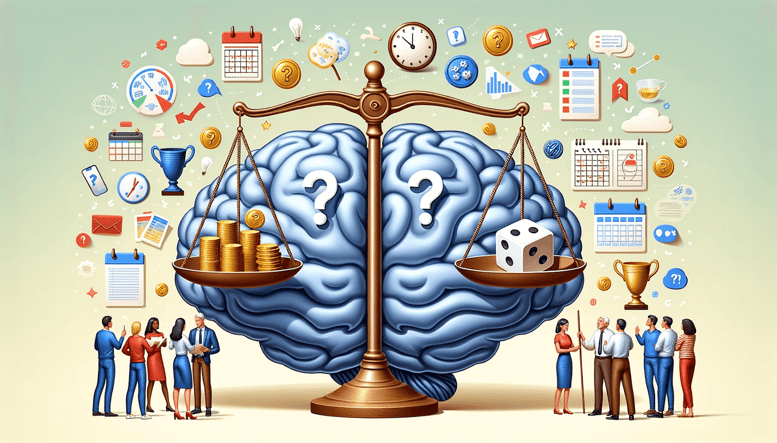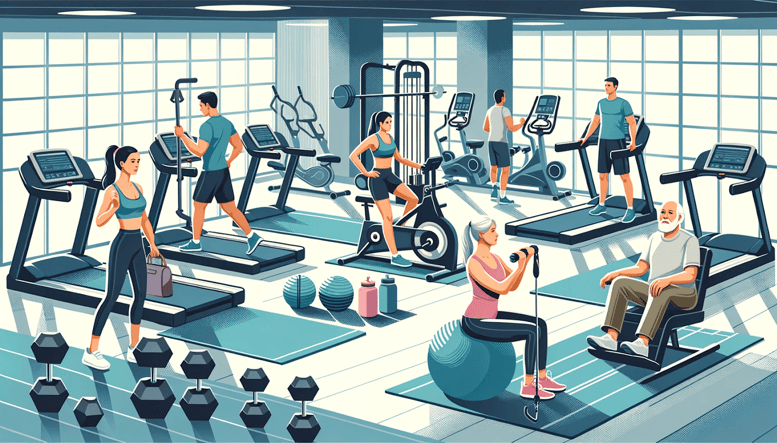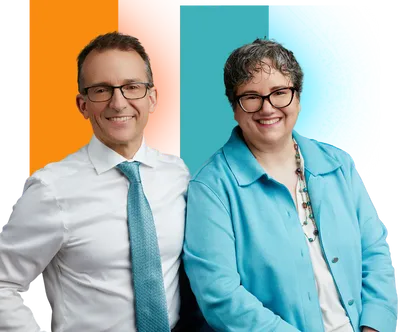
How Clutter Is Linked to Trauma - Taking the First Step to Understanding
Ever wondered about the profound link between the chaos of life and the surrounding clutter?
Watch the YouTube™ or read below:
Get Ready for an Exciting Journey!
Hi everyone, my name is Valerie. Throughout my life, unexpected events and challenges have thrown me off balance. Amidst it all, I began noticing a pattern - the growing clutter around me wasn't just about disorganization, it had deeper roots tied to my emotional state.
As I began exploring the concept of clutter, I stumbled upon research that revealed an interesting correlation between trauma and clutter. This discovery opened my eyes to a whole new perspective, one that was life-changing. And now, I want to share this knowledge with you.
Today, I invite you on this exciting journey as I unveil the mystery behind trauma and clutter.
The Cluttered Space Phenomenon:
Ever entered someone's house only to find it a mess, bursting with clutter? It's not just about being disorganized. The underlying reasons, surprisingly, might be tied to trauma.
Trauma, in any form, can have a significant impact on our minds and bodies. It triggers stress hormones that affect our decision-making abilities and behavior. In turn, this creates an environment conducive to clutter.
Trauma's Physical Response:
When trauma strikes, our body responds by going into stress mode. One of the prominent reactions includes the release of cortisol, a hormone influencing many body functions, including our immune system and metabolism.
An increase in cortisol can lead to a decrease in organizational skills, decision-making abilities, and energy levels. This can result in feelings of a cluttered space as it becomes challenging to keep up with daily tasks and responsibilities.
Clutter as a Coping Mechanism:
Post-trauma, the world can feel overwhelming. Clutter, oddly enough, offers a sense of familiarity and control, serving as a protective barrier against potential emotional triggers. The act of hoarding and keeping things close can feel like a way to protect oneself from further traumatic events and harm.
Unraveling the Clutter and Trauma Complex Relationship:
Both trauma and clutter can significantly alter our minds, impacting our routines, habits, and behaviors. And with elevated cortisol levels, our executive functions like memory, decision-making, and attention get affected, making decluttering even harder.
But here's the good news - by understanding this connection, we can take the first step towards breaking free from clutter and healing from trauma. It starts with acknowledging the pain and root cause and finding healthy coping mechanisms.
Stress, Cortisol, Emotional Clutter and the Brain:
Stress and mental clutter feed off each other in a never-ending cycle, reshaping our perception of the world and affecting our mental well-being. And as much as we want to rid ourselves of clutter, the brain's response to stress can make it challenging.
But by recognizing cortisol's role in this process and implementing stress-reducing techniques like meditation, exercise, and therapy, we can begin to break this cycle. This will not only help declutter our physical space but also aid in healing from trauma.
Delving Deep into the Brain's Structures:
Enter the amygdala, a small brain structure that plays a pivotal role in emotions, especially fear.
Consider the amygdala as the alarm system of your brain. Just like how a smoke detector in your home alerts you to the potential danger of a fire, the amygdala alerts the rest of your brain when it perceives a threat. This could be any event, person, circumstance, or experience that it identifies as emotionally charged or traumatic. By doing so, it readies your body to respond to the perceived threat, initiating a chain reaction in your brain's other structures.
When trauma happens, it's the amygdala that first registers the event. It's like the brain's alarm system, alerting the rest of the body about potential danger. So, how does this small but mighty structure in our brain relate to clutter? As we look further into the complex relationship between trauma, clutter, and the brain, we'll navigate the amygdala's role, building upon the above insights and setting the stage for the next segment of our journey.
When surrounded by clutter, it gets activated, amplifying anxiety, depression and fear levels, especially for those with traumatic histories. This, in turn, affects decision-making and organizational skills, leading to a vicious clutter-stress cycle.
The good news is that we can train our brains to respond differently by engaging in activities that stimulate the prefrontal cortex, responsible for impulse control and decision-making. This can aid in reducing the amygdala's over-activation and help us make better decisions regarding clutter.
The Prefrontal Cortex Connection and Mental Clutter:
Beyond the amygdala, clutter also influences the prefrontal cortex, responsible for executive functions. For trauma survivors, this impact is even more profound, leading to challenges in organization, motivation, and task execution.
Picture the prefrontal cortex as the CEO of your brain. Just like a CEO manages and controls various operations in a company, the prefrontal cortex oversees various cognitive and emotional responses. From decision-making and problem-solving to planning and regulating social behavior, the prefrontal cortex is in charge.
Now consider executive functions. These are like the various departments in a company such as marketing, finance, HR, and operations. Each department has a specific role and responsibility, all contributing to the smooth running of the company. In our brain, executive functions refer to a range of cognitive abilities including working memory, cognitive flexibility, and inhibitory control – all necessary for managing tasks, controlling impulses, organizing activities, and regulating behavior.
Just as a company cannot function efficiently if its departments are disorganized or its CEO isn't making sound decisions, our brain experiences similar stumbling blocks when trauma affects the prefrontal cortex and disrupts our executive functions.
Taking Control: Prefrontal Cortex, Executive Functions, and Overcoming Trauma-Induced Clutter:
Understanding the role of the prefrontal cortex and executive functions equips us with the knowledge to combat clutter, trauma, and stress. It's like understanding the CEO's role and the functions of various departments in a company, enabling us to streamline operations, improve decision-making, and enhance efficiency.
For trauma survivors dealing with clutter, strengthening the prefrontal cortex and enhancing executive functions is crucial. Here are some strategies:
Cognitive Behavioral Therapy (CBT): This therapy helps address thoughts and behaviors that contribute to clutter. It improves decision-making and organizational skills, both controlled by the prefrontal cortex.

Mindfulness and Meditation: Both stimulate the prefrontal cortex. Regular practice enhances executive functions, focus, and reduces impulsivity, aiding in clutter management.

Physical Exercise: Regular aerobic exercise stimulates brain health, including the prefrontal cortex, improving executive functions.

Healthy Diet: A diet rich in omega-3 fatty acids, antioxidants, and brain-friendly nutrients promotes prefrontal cortex health and improves executive functions.

Adequate Rest: Quality sleep and rest are crucial for brain health, including the prefrontal cortex. They consolidate memory, enhance focus, and maintain optimal executive functions.

Implementing these strategies enhances our brain's "CEO," the prefrontal cortex, and its "departments," the executive functions. This helps break the clutter-stress cycle, manage trauma, and improve overall quality of life. Understanding the science behind our brains and behaviors is the first step to change, and with this knowledge, we are well on our way to making that change.
This helps in decluttering and organizing our physical space but also has a positive impact on our mental and emotional well-being. By taking control of our brains, we can take back control of our clutter and create a more peaceful and organized environment for clean house and for ourselves.
So, the next time you're feeling overwhelmed by clutter or struggling to make decisions about what to keep or throw away, remember that your brain is capable of change, and with the right strategies and support, you can overcome trauma-induced clutter.
Breaking Free from the Trauma-Clutter Cycle:
Decluttering isn't just about organizing. It's therapeutic. A calm environment can reduce sensory overload, leading to decreased stress levels.
By acknowledging the link between trauma and clutter, we can begin to heal from both. It's a journey that isn't easy, but it is undoubtedly one worth taking.
The key to our discovery lies in implementing a comprehensive and impactful process. This process combines insights from modern neuroscience, psychology, and mindfulness practices. The issue with the clutter we face is that it forms a never-ending cycle that persists despite our efforts. To break free from this cycle, we must implement a determined and effective process. This proven process, known as the four-step holistic decluttering journey, consists of the following steps: Decluttering the stress, Decluttering the mind, Decluttering the time, and Decluttering the space or belongings.
By embracing this holistic approach, you can not only declutter your space but also enhance your overall well-being and gain a sense of control over your life.
Seeking Professional Support:
However, decluttering is not always a straightforward task, especially for trauma survivors. Seeking professional mental health support can be immensely valuable as it provides effective strategies to make the process less overwhelming. Nevertheless, one challenging aspect is the limited availability of professionals with experience and training in organizing and decluttering, particularly when combined with the complexities and symptoms of complex trauma or PTSD. These conditions require a unique approach to decluttering. Therefore, it's recommended to find a therapist who can guide you through this journey effectively.
Dealing with a cluttered space can be really overwhelming, especially when it's connected to past trauma. But here's the thing - we can actually break free from the clutter cycle and heal from our trauma at the same time! How? Well, by understanding the connection between the two and trying out some effective techniques like mindfulness and seeking professional support. You can even check out programs like the Doers Academy, where you'll find amazing professionals and experts to guide you along the way. Remember, you're not alone in this journey!
Clutter's Universal Impact:
Even without traumatic experiences, clutter can induce stress, overwhelm and anxiety. The negative implications on neurological health are universal. Therefore, decluttering is an essential aspect of self-care and maintaining good mental health. It's a process that requires understanding and compassion towards ourselves, rather than just focusing on the result.
It's crucial to recognize the connection between trauma and clutter and take proactive steps toward breaking free from this cycle.
The Path to Healing:
Amidst all the chaos, there's still hope. I mean, we all know how overwhelming clutter can be, right? But guess what? Taking small yet powerful steps to a decluttering journey can do wonders for your physical stuff mental well-being. It's like a journey, you know? It takes time and patience, but trust me, with the right mindset and tools, you can break free from all that clutter and start your healing process.
And you know what's even better? Every step you take towards decluttering not only creates a more peaceful physical space but also opens up pathways for emotional healing and growth. So, why not take that first step today? Start your journey towards a more fulfilling and clutter-free life. Don't let all that clutter and stuff hold you back from living your absolute best life.
Remember, the power to change lies within you! So keep decluttering, healing, and taking it one step at a time. And hey, it's not just about decluttering our physical space, but also our minds and hearts. Let's embark on this journey together and create a clutter-free and peaceful world for ourselves. Ready to join me?
Practical Tips for Reducing Clutter:
Start Small: Tackle decluttering in bite-sized tasks to avoid feeling overwhelmed. Start with a drawer or closet before moving on to larger areas.
Organize with Intent: Designate specific spots for items, streamlining your space. This will not only make it easier to find things but also prevent clutter from building up.
Detachment is Key: If it no longer serves a purpose, consider letting it go. Keep items with sentimental value, but don't hold on to things for the sake of it.
Trauma and emotional clutter can be overwhelming, but they don't have to dominate our lives. By understanding their interconnectedness and their impact on our well-being, we can embark on a healing journey toward a brighter, clutter-free future. With the right mindset, tools, and support, we can break free from the trauma-clutter cycle and create a more peaceful and fulfilling life for ourselves.
Get Ready to Take Action!
Are you inspired and prepared to transform your space and mindset? You're not alone in this journey. Reach out for support when needed, and take the first step towards a rejuvenated life and environment.
Disclaimer: The information provided in this document is not a substitute for professional medical advice, diagnosis or treatment. Always seek the advice of your physician or other qualified health providers with any questions you may have regarding a medical condition. Never disregard professional medical advice or delay in seeking it because of something you have read in this document.




